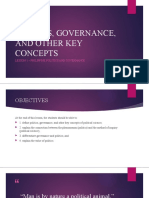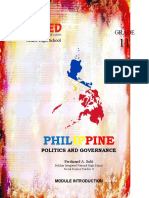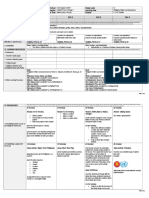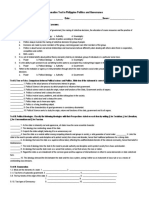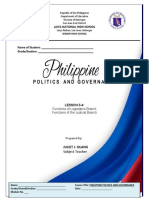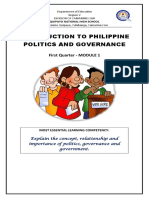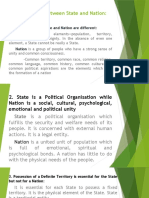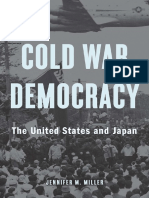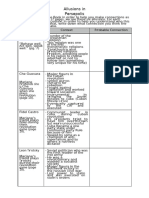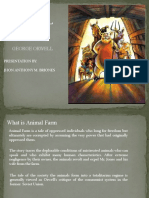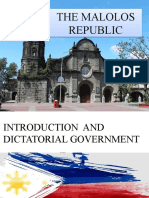University of Makati: Philippine Politics and Governance States, Nations, and Globalization
University of Makati: Philippine Politics and Governance States, Nations, and Globalization
Uploaded by
Mary Grace PayaoanCopyright:
Available Formats
University of Makati: Philippine Politics and Governance States, Nations, and Globalization
University of Makati: Philippine Politics and Governance States, Nations, and Globalization
Uploaded by
Mary Grace PayaoanOriginal Description:
Original Title
Copyright
Available Formats
Share this document
Did you find this document useful?
Is this content inappropriate?
Copyright:
Available Formats
University of Makati: Philippine Politics and Governance States, Nations, and Globalization
University of Makati: Philippine Politics and Governance States, Nations, and Globalization
Uploaded by
Mary Grace PayaoanCopyright:
Available Formats
UNIVERSITY OF MAKATI
J. P. Rizal Ext., West Rembo, Makati City
HIGHER SCHOOL NG UMAK
DEPARTMENT OF SOCIAL SCIENCES
Course Title Title
Module No. 4
PHILIPPINE POLITICS AND STATES, NATIONS, AND GLOBALIZATION
GOVERNANCE
Learning Objectives 1. Discuss state, nation and globalization;
At the end of the module, the 2. Differentiate state from nation as a political concept and
learner will be able to: 3. Evaluate how globalization influences nation-states.
During World War II, the Philippines cannot be considered as a state that has lost its independence or
INTRODUCTION
sovereignty from the Japanese Imperial Army. However, although it cannot be called a state at the time having
lost one of the important elements of a state, it can be still be considered as a nation in as much as its people
were bound by common traits, traditions, cultures, and values. After the declaration of Philippine Independence
in July 1945, it finally gained the full term of statehood. When it acceded to the World Trade Organization (WTO)
in 1995, the country demonstrated its determination to face the challenges of globalization. Recognizing that
globalization is the buzzword of the 21st century and inevitably affects the growth and governance of many
nation-states, the Philippines bravely entered the WTO to prepare itself for global competitiveness and reap
the benefits that globalization may bring.
PRELIMINARY
Activity: Made of the Philippines
ACTIVITY
Directions: Give your insights about the question stated.
What makes up the Philippines as a country?
I. CONCEPT OF STATE State- comes from the Latin word stare (to stand).
It is a political community that occupies a definite territory; having an
organized government with the authority to make and enforce laws
without the consent of a higher authority.
Also, it is defined as a self-governing, political identity. The term state
can be used interchangeably with the country.
Elements of the State
1. People 2. Territory
CONTENT
3. Sovereignty 4. Government
ELEMENTS OF THE STATE
1. People 2. Territory
Also known as population or Refers to the portion of the earth
inhabitants composed of aerial (air space above),
fluvial (waters around and connecting
the islands of the archipelago) and
terrestrial (landmass) domains.
PREPARED BY: MARY GRACE M. PAYAOAN
3. Sovereignty 4. Government
Refers to supreme and absolute Refers to the institution or agency
power within its territorial or instrumentalities through which
boundaries. the state maintains social order,
provide public services, and
enforces binding decisions.
How can a STATE acquire TERRITORY?
There are four modes by which a state can acquire a territory, they are as follows:
a. DISCOVERY and OCCUPATION- through a discovery of an island, or a land without inhabitants or occupants,
and thereafter occupying and placing it under political administration, a state may acquire a territory.
In order to be considered a territory of a state, discovery must be coupled with effective occupation.
Effective occupation is under the following circumstances: When the party occupying the territory was
authorized by the state for which he was acting; the state declared through a formal act of its intention to
acquire sovereignty over the territory and governmental authority must be established within a reasonable time
after discovery.
b. PRESCRIPTION- it is the mode of acquiring a territory through continuous and undisputed exercise of
sovereignty over it during such period as is necessary to create under the influence of historical development
the general conviction that the present condition of things is in conformity with international order.
c. CESSION- it pertains to the assignment, transfer, or yielding up territory by one state or government to
another.
d. SUBJUGATION and ANNEXATION- it is a mode of acquiring territory by occupation and conquest made by
another state in the course of war and by annexation after the end of the war.
TYPES OF SOVEREIGNTY
A. Internal Sovereignty- the power of the state to rule within its territory.
B. External Sovereignty- the freedom of the state to carry out its activities without subjection to control or
control by other states.
FORMS OF GOVERNMENT
The GOVERNMENT is the agency that carries out the will of the people. Its main objective is to protect the people from
both external and internal harm. The government promotes the people's desire to live in harmony among themselves
and to those in other states.
A. UNITARY- government power is held by one central authority. Ex:
Philippines, Denmark, Italy, Finland, Peru, Rwanda.
B. CONFEDERATION- a voluntary association of independent states that
I. Distribution of often delegate a few powers to the central government. Weak or loose
Power organization of states agrees to follow a powerful central government.
Ex: The Commonwealth of Independent States (CIS) formerly known as the
Soviet Union, Switzerland's Canton System.
C. FEDERAL GOVERNMENT POWER- is divided between one central and
several regional authorities. Ex: Malaysia, USA, Nigeria, Australia.
A. AUTOCRACY- form of government wherein one person possesses
II. Citizen unlimited power. The citizen has limited, if any, role in government. The
Participation leader is from a strong family/social class/strong party.
PREPARED BY: MARY GRACE M. PAYAOAN
Monarchy- a government in which the supreme power is lodged in the
hands of a monarch who reigns over a territory, usually by hereditary life;
the monarch may be either a sole absolute ruler or a sovereign
(King/Queen/Prince- with constitutionally limited power).
Forms of Autocratic Government
1. Absolute/Totalitarian Dictatorship- the ideas of a single leader
glorified. Government tries to control all aspects of social and economic
life. Moreover, the government is not responsible to the people. Thus, the
people lack the power to limit their rulers. Ex: Adolf Hitler, Benito
Mussolini, Joseph Stalin.
2. Absolute Monarchy- the King/Queen/Emperor exercises the
supreme and unlimited powers of government wherein the position is
usually inherited. Absolute monarch rules by divine right are rare today but
from the 1400s to the 1700s they ruled most of Western Europe (Ex: King
of Saudi Arabia). The counterpart of absolute monarchy is limited
monarchy wherein the ruler has a limited power as mandated by the
constitution.
B. OLIGARCHY- it is the government by the few. Sometimes a small group
exercises control, especially for corrupt and selfish purposes. The group
gets its power from military power, wealth, religion, or a combination. In
here, the citizen has a very limited role. Thus, political opposition is usually
suppressed-sometimes violently. Ex: Communist countries such as China
and North Korea. Leaders in the party and armed forces control
government.
C. DEMOCRACY- a government based on the content of the governed. The
people are sovereign, thus, they hold the highest political authority.
Citizens have freedom to criticize their leaders for they elected them in the
position. People have a high degree of participation in every government
processes.
Two forms of Democracy
1. Indirect/Representative Democracy- a democratic government
wherein the people directly elect their leaders who will govern them and
perform governmental functions
2. Direct Democracy- people will convene in a mass assembly and
directly formulate and expresses the will of the state.
A. De jure. It is a form of government wherein it has the people's support
and possess constitutional mandate. Therefore, it is legitimate
government.
B. De facto. It is form of government supported by the people but no
III. Legitimacy
constitutional mandate or legal support.
PREPARED BY: MARY GRACE M. PAYAOAN
A. Presidential- the executive branch exists separately from the
legislature. The president is constitutionally independent of the
IV. Executive & legislature because they are elected directly by the people.
Legislative B. Parliamentary- the members of an executive branch (the cabinet and
Relationship its leader- a Prime minister/Premier/Chancellor) are nominated for their
Legitimacy positions by a legislature or parliament, and are directly responsible to it.
The members of the executive branch are also members of the parliament
or the legislature. Moreover, this type of government can be dissolved at
will by the parliament (legislature) by means of no confidence vote or the
leader of the cabinet may dissolve the parliament if it can no longer
function.
1. Has space/territory which has internationally recognized
boundaries (boundary disputes are okay).
2. Has people who live there on an ongoing basis.
3. Has economic activity and an organized economy. A country
regulates foreign trade and domestic trade and issues money.
4. Has the power of social engineering, such as education.
5. Has a transportation system for moving goods or services.
6. Has a government which provided public services and police
power.
Characteristics of 7. Has sovereignty. No other state should have power over the
country's territory.
an Independent
8. Has external recognition. A country has been "voted into
State
the club" by other countries.
ORIGINS OF THE STATE
A state evolved from family units. The families grew into a large extended
family that heads of the family served as a government. Eventually
evolved into tribal councils with a hierarchy of authority.
I. EVOLUTION THEORY
A government, emerged when people were brought under the control of
some power. States emerged from the conquest of other families or
tribes.
II. FORCE THEORY
PREPARED BY: MARY GRACE M. PAYAOAN
A belief that kings are chosen to rule the Ancient state by a deity
examples include Egyptians and Aztecs. In 15th Century Europe, the
idea is used by royalty as the justification for the absolute domination,
therefore, to question the king was not only treason but seen as a sin
against God.
III. DIVINE RIGHT THEORY
It existed during the 17th Century and Age of Enlightenment. People
begin to challenge the monarchy and the idea of Divine Right.
IV. SOCIAL CONTRACT
Thomas Hobbes John Locke Jean-Jacques Rousseau
Men lived in a primitive Man sought peace and Good person was
society where there is war preservation of all corrupted
"of every man, against every humanity Society is ruled by greed,
man" Man produce a standing lust, and violence.
Man's life was solitary, poor, rule to live by Nation-state got worse
nasty, brutish and short Man entered into Called for the agreement
Out of this condition, the contract to assure of the citizen to meet
STATE was born safety and peace that and discuss difficulties
To escape this cruel reality, life, liberty, and Consensus knew as the
men would give up some property may be General Will
freedom to the state; in enjoyed to the fullest
return, the government The contract is two-way
(STATE) would offer people
security through law and
order
PREPARED BY: MARY GRACE M. PAYAOAN
INHERENT POWER OF THE STATE
POLICE POWER
Power of the state to regulate freedoms and property rights of individuals for the
protection of public safety, health, and morals or the promotion of the public
convenience and general prosperity. This is because the Welfare of the people is the
supreme law.
EMINENT DOMAIN
Power to take private property for public use upon payment of just compensation. It is
exercised through national or local government and private persons or corporations
authorized to exercise functions of public character.
TAXATION
Power to impose tax on individuals and properties to support the government.
•Tax- lifeblood of government
•Uniform taxation- persons or things belonging to the same class shall be taxed at the
same rate.
•Equitable taxation- tax burden must be imposed according to the taxpayers' capacity
to pay.
•Progressive taxation- as the resources of the taxpayer becomes higher his rates
likewise increase.
II. Concept of NATION Nation
The social construction of a collective identity. It is an imagined political
community that is imagined as both inherently limited and sovereign. It
is also defined as a group of people who share the same history,
geography, language, customs, and sometimes religion (Anderson 1991,
Poggi 2008).
PREPARED BY: MARY GRACE M. PAYAOAN
Define boarders and territories
Same type of people exist
NATION STATE
Organized by race or background
Generally speaks on language
DISTINCTION BETWEEN THE STATE AND NATION (MURALI, ET.AL. 2005)
STATE NATION
Exited not only at present but also in the Modern phenomenon
ancient period. It is racial cultural
It is legal political. People psychologically joined together with
People organized for law within a definite common will to live together.
territory People continue as a nation even if they do not
A state must be sovereign remain sovereign.
Inhabited by heterogeneous groups of Inhabited by homogeneous groups of people.
people
III. Concept of GLOBALIZATION
Globalization also known as global industrialism is a process of
forging international political, economic, religious, and socio-
cultural interconnections. The concept of sovereign nation-states
is increasingly being challenged by globalization.
Globalization is a contested concept.
PREPARED BY: MARY GRACE M. PAYAOAN
SORENSEN (2008) ARGUES THAT MODERN STATES ARE BASED ON:
1. National Economy: Removal of geographical barriers to trade and the building of a nation-wide
infrastructure.
2. National Government: A centralized system of democratic rules and active political administrative
capacities within a precisely defined territory.
3. Nation: People who build a community of sentiment and a community of citizens.
4. Sovereignty: No final political authority outside or above the state.
However, according to Sorensen (2008), these characteristics are transformed by globalization: The
economy is increasingly embedded in cross-border networks. "Shallow and profound integration"; National
government is replaced by multi-level governance; Nation: Globalization reinforces collective identities
"above" and "below" the nation and there is evidence of an emerging "western civic identity" but also of
"resistant identities"; Sovereignty; the rule of non-intervention is challenged is a world of multi-level
governance. But still consent of states needed. States in the process of transformation: "post-modern"
states.
PREPARED BY: MARY GRACE M. PAYAOAN
Activity: COUNTRY IDENTIFICATION
Name:____________________________________ Grade and Section:______________________
Directions: Make a thorough research about the countries given in the box. Identify countries and try to find
whether they are nation-states as well and give specific ideas that classify them as a nation-state.
JAPAN NEW ZEALAND AUSTRIA ARGENTINA
USA CANADA MEXICO RUSSIA
KUWAIT SPAIN MOROCCO JORDAN
PHILIPPINES MALAYSIA INDIA THAILAND
COUNTRY (NATION-STATE) EXPLANATION
ASSESSMENT
Criteria
Content and Descriptions-25
Purpose and Supporting Details-10
Clarity and Transparency-15
PREPARED BY: MARY GRACE M. PAYAOAN
Home Mission: RESEARCH WORK
Name:____________________________________ Grade and Section:______________________
ASSIGNMENT
Directions: Discuss the five positive and five negative effects of GLOBALIZATION on Philippines using a graphic
organizer. Explain relevant ideas and thoroughly support your answer using timely and updated news.
Criteria:
Content and Descriptions-25
Purpose and Supporting Details-10
Organization and Structure- 15
Books
Ayson, F. G. & Reyes, A. A. (2000). Fundamentals of Political Science. National Book Store
Tabajen, R. C. & Pulma, E. B. (2016). Philippine Politics and Governance. JFS Publishing Services
REFERENCES
Braza-Oro, L. T. & Oro, A. (2010). Handbook on POLITICS and GOVERNANCE with Philippine Constitution. 2nd
Revised Edition
Online Sources
https://apcss.org/Publications/Edited%20Volumes/GrowthGovernance_files/Pub_Growth%20Governance/Pu
b_GrowthGovernancech16.pdf
PREPARED BY: MARY GRACE M. PAYAOAN
You might also like
- (FREE PDF Sample) (Ebook PDF) The Western Heritage: Volume 2 11th Edition EbooksDocument51 pages(FREE PDF Sample) (Ebook PDF) The Western Heritage: Volume 2 11th Edition Ebooksmiykoyowi100% (5)
- Politics, Governance, and Other Key ConceptsDocument22 pagesPolitics, Governance, and Other Key ConceptsMissMae QATNo ratings yet
- Introduction: The Concepts of POLITICS and GovernanceDocument34 pagesIntroduction: The Concepts of POLITICS and GovernanceJanice Dano OnaNo ratings yet
- Political and Governance in The PhilippinesDocument23 pagesPolitical and Governance in The PhilippinesMaureen Gayle Salmasan100% (1)
- Henry F. Carey - Romania Since 1989. Politics, Economics, and SocietyDocument666 pagesHenry F. Carey - Romania Since 1989. Politics, Economics, and SocietyDarius MeşterNo ratings yet
- Traslation of Children Literature During FascismDocument354 pagesTraslation of Children Literature During Fascismamkorg15No ratings yet
- States, Nation and Globalization HandoutsDocument5 pagesStates, Nation and Globalization HandoutsChacatherine Mirasol100% (1)
- Politics and Governance 5Document21 pagesPolitics and Governance 5Cyndy BautistaNo ratings yet
- Concept of Political Science HandoutsDocument8 pagesConcept of Political Science HandoutsEldon Kyle JubaneNo ratings yet
- States Nations and GlobalizationDocument3 pagesStates Nations and GlobalizationChristine Ann JuguanNo ratings yet
- Nation, State and GlobalizationDocument63 pagesNation, State and GlobalizationCharlene Mae GraciasNo ratings yet
- PPG Chapter 1 Part 1Document50 pagesPPG Chapter 1 Part 1ricoliwanagNo ratings yet
- PPG Q1 Module-1Document16 pagesPPG Q1 Module-1Malla RiveraNo ratings yet
- Grade: Senior High SchoolDocument15 pagesGrade: Senior High SchoolMARION LAGUERTA100% (1)
- PPG, Quater 1 (Week 1-4)Document47 pagesPPG, Quater 1 (Week 1-4)Elmer100% (1)
- States, Nations, and GlobalizationDocument20 pagesStates, Nations, and Globalizationsidpelingon100% (1)
- PPGDocument9 pagesPPGnhfdbhddhsdeyterhguyNo ratings yet
- Philippine Politics and GovernanceDocument127 pagesPhilippine Politics and GovernanceAlvin GadutNo ratings yet
- Philippine Politics and Governance. NotesDocument9 pagesPhilippine Politics and Governance. NotesGretchen Barnayha LeeNo ratings yet
- Philippine PoliticsDocument34 pagesPhilippine PoliticsRosnia Sumang100% (1)
- Topic 1 - Concept of PoliticsDocument11 pagesTopic 1 - Concept of PoliticsI hate school bishNo ratings yet
- Philippine Politics and Governance 1Document45 pagesPhilippine Politics and Governance 1Khen Eros Narciso100% (1)
- PPG Week e States Nations and GlobalizationsDocument9 pagesPPG Week e States Nations and GlobalizationsRobin Lee MetiamNo ratings yet
- Philippine Politics and Governance - AY 2020 - 2021Document129 pagesPhilippine Politics and Governance - AY 2020 - 2021bb JisooNo ratings yet
- Philippine Politics and GovernanceDocument24 pagesPhilippine Politics and GovernanceRyan TamelinNo ratings yet
- PPG Melc 4Document17 pagesPPG Melc 4Jov EstradaNo ratings yet
- PPG Week 1Document32 pagesPPG Week 1Paul Enrique CasasNo ratings yet
- Lesson 3: Political Ideologies (The Basic Tenets of The Major Political Ideologies (I.e., Liberalism, Socialism, Conservatism, Etc.)Document4 pagesLesson 3: Political Ideologies (The Basic Tenets of The Major Political Ideologies (I.e., Liberalism, Socialism, Conservatism, Etc.)asiel mangubatNo ratings yet
- Philippine Politics and Governance: Senior High SchoolDocument18 pagesPhilippine Politics and Governance: Senior High Schoolsandra mae dulayNo ratings yet
- PPG Module 2Document15 pagesPPG Module 2jetirish saballaNo ratings yet
- Decentralizationandlocalgovernancepolitics 180607083610Document24 pagesDecentralizationandlocalgovernancepolitics 180607083610Juan LorenzoNo ratings yet
- Melc 4 DissDocument13 pagesMelc 4 DissjoelNo ratings yet
- Summative TestDocument1 pageSummative TestRovz GC BinNo ratings yet
- State Non State InstitutionDocument29 pagesState Non State Institutionpim pimNo ratings yet
- Learning Module 4 PPG Lesson 6-8Document26 pagesLearning Module 4 PPG Lesson 6-8Shaena Ellain BondadNo ratings yet
- Philippine Politics and Governance: Senior High SchoolDocument14 pagesPhilippine Politics and Governance: Senior High SchoolFamela AlvarezNo ratings yet
- 1.PPG Politics Melcs 1Document59 pages1.PPG Politics Melcs 1Naruzaki KaisenNo ratings yet
- PPG The Evolution of Philippine Politics and GovernanceDocument8 pagesPPG The Evolution of Philippine Politics and GovernanceJennifer Hilario EvangelistaNo ratings yet
- module-7-PPG Maam JoyDocument11 pagesmodule-7-PPG Maam JoyMiyu Viana100% (1)
- PPG Reporting LguDocument50 pagesPPG Reporting LguArianne Lois LabasanNo ratings yet
- Q1 Module 4 PoliticsDocument11 pagesQ1 Module 4 PoliticsJohn Dee EquisaNo ratings yet
- Chunk 1 Applied Econ - 1ST SemDocument39 pagesChunk 1 Applied Econ - 1ST SemMary Ann EstudilloNo ratings yet
- Philippine Politics and Governance: Arman M. Bueno, RPMDocument76 pagesPhilippine Politics and Governance: Arman M. Bueno, RPMChronos ChronosNo ratings yet
- Philippine Politics and Governance: Quarter 1Document5 pagesPhilippine Politics and Governance: Quarter 1Claire Alvaran100% (1)
- PPG Q2 Week 5 Module 10 Election and Political PartieseDocument3 pagesPPG Q2 Week 5 Module 10 Election and Political PartieseRoi S. ReconNo ratings yet
- Philippine Politics and GovernanceDocument24 pagesPhilippine Politics and GovernanceJoelyn Zane DupolNo ratings yet
- PPG Module 1 Part IDocument10 pagesPPG Module 1 Part Ijetirish saballaNo ratings yet
- PPG Quarter 2 Module 1Document10 pagesPPG Quarter 2 Module 1jetirish saballaNo ratings yet
- Elections and Political Parties: School Grade Level Teacher Learning Area Time & Dates QuarterDocument6 pagesElections and Political Parties: School Grade Level Teacher Learning Area Time & Dates QuarterGomez NoskacjNo ratings yet
- PPG Week b2 - Political IdeologiesDocument11 pagesPPG Week b2 - Political IdeologiesWilly Batalao Puyao100% (2)
- Responsible Use of Media and InformationDocument15 pagesResponsible Use of Media and InformationRenalyn Rose Mandique100% (1)
- Week 1Document14 pagesWeek 1liz ivy sarratoNo ratings yet
- Philippine Politics and GovernanceDocument126 pagesPhilippine Politics and Governancejaeson marianoNo ratings yet
- Historical Background of Philippine DemoDocument36 pagesHistorical Background of Philippine DemoRy Rssl Höbö100% (3)
- Politics and Governance: Laiya National High SchoolDocument8 pagesPolitics and Governance: Laiya National High SchoolJoy Valdez Javier-SilangNo ratings yet
- PPG - Module 1 Activity Sheets - Module Batch 1Document6 pagesPPG - Module 1 Activity Sheets - Module Batch 1Melanie Dinoy100% (2)
- PPG Module 7 2nd Sem Grade 11 Humss Bonifacio-Agoncillo MR - Paombong Mrs CuencaDocument9 pagesPPG Module 7 2nd Sem Grade 11 Humss Bonifacio-Agoncillo MR - Paombong Mrs CuencaArnold PaombongNo ratings yet
- Difference Between State and NationDocument10 pagesDifference Between State and NationJoefaithNo ratings yet
- Political IdeologiesDocument11 pagesPolitical Ideologiesapi-246388872No ratings yet
- Philippine Politics and GovernanceDocument43 pagesPhilippine Politics and GovernanceLolilyd ArtiagaNo ratings yet
- Ma. Aiza Santos Week 9 The Executive Branch 1Document16 pagesMa. Aiza Santos Week 9 The Executive Branch 1Moises John Sangalang100% (1)
- Phil Pol Week 5 NotesDocument5 pagesPhil Pol Week 5 NoteskayeNo ratings yet
- Week 5 6Document6 pagesWeek 5 6danielmangubat36No ratings yet
- Maurice Cornforth - Reader's Guide To Marxist Classics (1954, Lawrence & Wishart LTD.) - Libgen - LiDocument120 pagesMaurice Cornforth - Reader's Guide To Marxist Classics (1954, Lawrence & Wishart LTD.) - Libgen - LiGabriel Gonçalves Martinez100% (1)
- Putin Unbound PDFDocument15 pagesPutin Unbound PDFRuben MascarenhasNo ratings yet
- Weak Dictator: Revision:Hitler - Weak Dictator or Master of The Third ReichDocument7 pagesWeak Dictator: Revision:Hitler - Weak Dictator or Master of The Third ReichAhhh HahahaNo ratings yet
- De StalinizationDocument10 pagesDe Stalinizationbaterdene baagiiNo ratings yet
- White GreekTyranny 1955Document19 pagesWhite GreekTyranny 1955Jose Miguel Gomez ArbelaezNo ratings yet
- UntitledDocument369 pagesUntitledミャグマルジャブムンヒシュル・SangoNo ratings yet
- Joornalii Seeraa Oromiya Jildi 8ffaaDocument188 pagesJoornalii Seeraa Oromiya Jildi 8ffaaIntisar Ramedan80% (5)
- The Sounds of Terror Post Punk After 1977Document19 pagesThe Sounds of Terror Post Punk After 1977Caio FalcãoNo ratings yet
- Animal FarmDocument10 pagesAnimal FarmsidNo ratings yet
- Democracy - Stories From The Long Road To Freedom (PDFDrive)Document354 pagesDemocracy - Stories From The Long Road To Freedom (PDFDrive)Driss BoukaaNo ratings yet
- 1984 ScriptDocument2 pages1984 Scriptneupane.sanjan01No ratings yet
- Ans On GrassrootfascismDocument4 pagesAns On Grassrootfascismvansss2212No ratings yet
- Defend Our Democracy - Final StatementDocument13 pagesDefend Our Democracy - Final StatementDM Photos100% (5)
- Animal Farm NotesDocument7 pagesAnimal Farm NotesNaveen MahadeoNo ratings yet
- Allusions in Persepolis WordDocument2 pagesAllusions in Persepolis Wordmanu.adaimeNo ratings yet
- Full download Henry Kissinger and the American Century Jeremi Suri pdf docxDocument85 pagesFull download Henry Kissinger and the American Century Jeremi Suri pdf docxhirettrdeaj100% (11)
- Hal Draper Karl Marx and Simon BolívarDocument13 pagesHal Draper Karl Marx and Simon Bolívarhealthyhao666No ratings yet
- The Rise of DictatorshipDocument2 pagesThe Rise of Dictatorshipnhbinaaa111No ratings yet
- Animal FarmDocument18 pagesAnimal FarmJuan Antonio100% (2)
- Chapter 3 ILADocument7 pagesChapter 3 ILAsiphomanciyaNo ratings yet
- Dialogue in Hell Between Machiavelli and MontesquieuDocument153 pagesDialogue in Hell Between Machiavelli and MontesquieuzwaaierNo ratings yet
- Weber, Eugen. "The Men of The Archangel." Journal of Contemporary History, Vol. 1, No. 1, 1966, Pp. 101-126. JSTOR,. Accessed 8 May 2021.Document27 pagesWeber, Eugen. "The Men of The Archangel." Journal of Contemporary History, Vol. 1, No. 1, 1966, Pp. 101-126. JSTOR,. Accessed 8 May 2021.Daniel CucuNo ratings yet
- Chapter 8 The Malolos RepublicDocument22 pagesChapter 8 The Malolos RepublicApril CaringalNo ratings yet
- AutocraticDocument8 pagesAutocraticLeahna Ysabel NevadoNo ratings yet
- Antigone - 2 PagerDocument3 pagesAntigone - 2 PagerYusraNo ratings yet
- Bataille, Georges. Toward Real RevolutionDocument11 pagesBataille, Georges. Toward Real Revolutionmarc.a.martins6667No ratings yet
- Old MajorDocument3 pagesOld Majoryathinkantramajal9284No ratings yet

